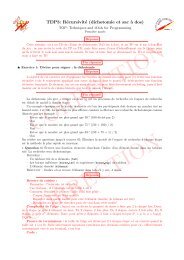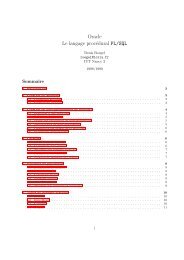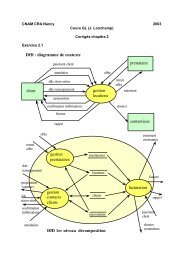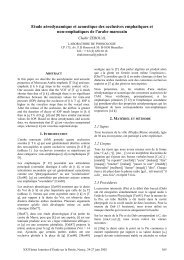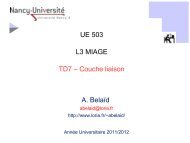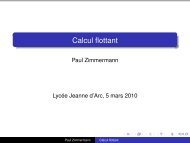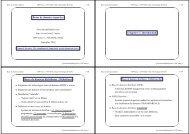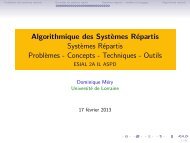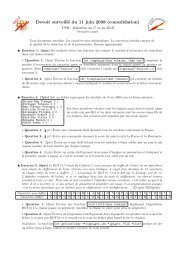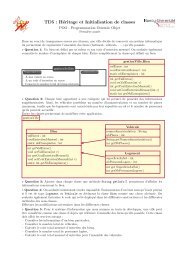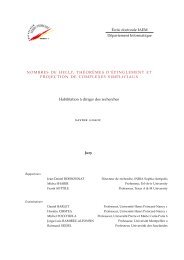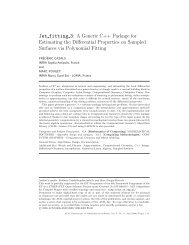Logical Analysis and Verification of Cryptographic Protocols - Loria
Logical Analysis and Verification of Cryptographic Protocols - Loria
Logical Analysis and Verification of Cryptographic Protocols - Loria
Create successful ePaper yourself
Turn your PDF publications into a flip-book with our unique Google optimized e-Paper software.
5.8. DECIDABILITY OF REACHABILITY PROBLEMS FOR SUBTERM CONVERGENT THEORIES143<br />
Completeness. The pro<strong>of</strong> <strong>of</strong> the following lemma is trivial by the form <strong>of</strong> increasing<br />
rules.<br />
Lemma 54 If σ |= E ⊲inc f(t1, . . . , tn) then either f(t1, . . . , tn)σ ∈ Eσ or<br />
x1, . . . , xn → f(x1, . . . , xn) will be in L0 <strong>and</strong> for each i ∈ {1, . . . , n} we have<br />
σ |= E ⊲inc ti.<br />
The first part <strong>of</strong> the iteration consists either in transforming a deduction constraint<br />
E ⊲inc f(t1, . . . , tn) into E ⊲inc t1, . . . , E ⊲inc tn, or in unifying f(t1, . . . , tn)<br />
with e ∈ E. By Lemma 54, given a ground substitution σ such that σ |=<br />
E ⊲inc f(t1, . . . , tn) there exists a sequence <strong>of</strong> choices reducing E ⊲inc f(t1, . . . , tn)<br />
to a (possibly empty) set <strong>of</strong> deduction constraints Eτ ⊲incu1, . . . Eτ ⊲incuk where<br />
the u1, . . . , uk are variables or constants. If there is a constant which is not in Eτ<br />
the constraint is not satisfiable (by definition <strong>of</strong> increasing rules), <strong>and</strong> the sequence<br />
<strong>of</strong> choices fails.<br />
Let us now consider the second part <strong>of</strong> the iteration.<br />
Lemma 55 Assume σ |= E ⊲inc x with x the first variable in the sequence <strong>of</strong> deduction<br />
constraints such that t ∈ Sub(xσ) for some ground term t. Then either there exists<br />
u ∈ Sub(E) such that uσ = t or t ∈ Eσ L′ inc .<br />
PROOF.<br />
Let us assume there does not exist u ∈ Sub(E) such that uσ = t. By minimality<br />
<strong>of</strong> x <strong>and</strong> the determinacy <strong>of</strong> constraint systems we have t /∈ Sub(V ar(E)σ).<br />
Since Sub(Eσ) = Sub(E)σ ∪ Sub(V ar(E)σ) we have t /∈ Sub(Eσ) <strong>and</strong>, by hypothesis<br />
on x <strong>and</strong> t, t ∈ Sub(xσ). Since σ |= E ⊲inc x consider a derivation<br />
E1 = Eσ → . . . → En−1 ∪ xσ, <strong>and</strong> let i be minimal such that t ∈ Sub(Ei). The<br />
index i exists since t ∈ Sub(xσ), <strong>and</strong> is different from 1 since t /∈ Sub(Eσ). By<br />
definition <strong>of</strong> the increasing rules we then must have Ei = Ei−1, t. �<br />
Consider a I ′ -constraint system C = (Cα, E ⊲ t, Cβ) satisfied by a substitution<br />
σ <strong>and</strong> all deduction constraints in Cα are in solved form. By Lemma 53 <strong>and</strong><br />
by the facts that I ′ is I0-strongly order local <strong>and</strong> r /∈ � l for all rules � l → r ∈ L ′ ,<br />
all decreasing rules applied on Eσ yield a term in Sub(Eσ). Thus there are<br />
at most |Sub(E) \ V ar(E)| different terms that can be obtained by decreasing<br />
rule starting from Eσ <strong>and</strong> which are not in Sub(V ar(E)σ). Assume a term t<br />
is in Sub(V ar(E)σ) \ Sub(E)σ, <strong>and</strong> let x be the first variable (in the ordering<br />
<strong>of</strong> deduction constraints) such that t ∈ Sub(xσ). By definition <strong>of</strong> constraint<br />
systems there exists a deduction constraint Ex ⊲inc x in Cα. Since Ex ⊆ E, by<br />
Lemma 55, we have t ∈ Exσ L′ inc . Again, since Exσ ⊆ Eσ, this implies t ∈<br />
Eσ L′ inc : the decreasing rule was not useful, <strong>and</strong> can be replaced by a sequence<br />
<strong>of</strong> derivation ending with an increasing rule. Thus in Eσ at most |Sub(E) \<br />
V ar(E)| terms are deducible using decreasing rules that can not be deduced



